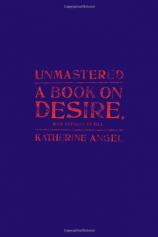Reading Group Guide
Discussion Questions
Unmastered: A Book on Desire, Most Difficult to Tell

1. In what ways did the book change the way you think about desire and identity? Which passages resonated the most for you? Which made you feel uncomfortable? Did any make you feel relief? Joy? Pleasure? Anger?
2. How do cultural norms shape sexuality? And how does this book challenge or reinforce those norms? How does the way we talk about sexuality influence our understanding of it?
3. What does the book reveal about the dynamic between the masculine and the feminine—in terms of control, of anatomy, of behavior, of expectations?
4. In what ways do the author’s experiences of joy and grief, pleasure and pain, correspond to one another? Describe the different manifestations of intensity and extremes in the book. Can you draw parallels to your own life?
5. How was your reaction to UNMASTERED shaped by the fact that it is a work of nonfiction, written by a scholar of sexuality and culture? Would your response be different if it were a memoir written by a novelist? Can you imagine reading something similar, written by a man? A mother? A lesbian?
6. The book interweaves segments of extremely personal confession with cinematic scenes and lines that feel more like poetry. How does this structure influence your experience of the book? How does it affect pace and emphasis? Do you see a relationship between the form and the author’s development, between the form and the argument the book seeks to make? How does the form enact claims that the author makes?
7. How do the author’s romantic relationships influence her perceptions of reality? Does that influence change over the course of the book? How?
8. How does the book explore the relationship between our sexual selves and our family life?
9. In what ways has the book articulated or changed your idea of feminism? How does the author reconcile her definition of feminism with her status as an object of desire? Beyond physical gratification, what does sex deliver for the narrator and for the man she loves? What does it mean to be a “Dupe. Collaborator. Victim” (page 171)?
10. How would you respond to the author’s question on page 174: “Am I pornography?” Do you agree with her assertion that pornography endlessly affirms male potency? Is that wrong?
11. What does the book say about our attempts to use storytelling and written words to capture a highly emotional experience? How do we communicate desire? What does it mean to be taken at your word? What are the implications of a “safe word”?
12. Discuss the revelations in “Left Almost Mute,” which begins on page 235. What choices would you make in a similar situation? What aspects of the author’s body and mind are revealed to her at this crossroad?
13. Which of the book’s literary quotations resonated with you the most? How do Virginia Woolf and Susan Sontag reflect womanhood as it was experienced during their lifetimes? What timeless, universal aspects of womanhood are captured in their words?
14. What does the book’s title indicate about mastering another person, mastering oneself, or resisting being mastered? What does it say about the relationship between sex and power? What makes the author’s narrative “most difficult to tell”?
15. What did the book help you discover about the difference between coercion and “coming safely into port”? Which approach is more likely to propel desire?
16. What is the impact of the book’s closing lines? Do they indicate progress or destruction?
17. How do we know what our desire is? How does the author identify what she wants? Do you know what you desire, and why? What helps you and hinders you in knowing what you want?
18. Is UNMASTERED a book about sex? Or about language about sex?
Unmastered: A Book on Desire, Most Difficult to Tell
- Publication Date: June 4, 2013
- Genres: Women's Studies
- Hardcover: 368 pages
- Publisher: Farrar, Straus and Giroux
- ISBN-10: 0374280401
- ISBN-13: 9780374280406







